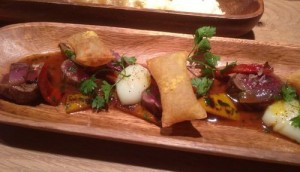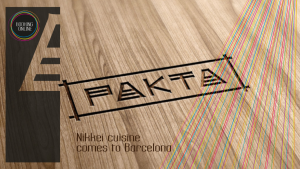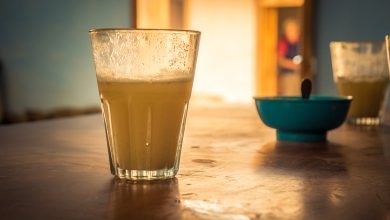Peruvian Treasure Claims Barcelona

Peruvian cuisine continues its stunning conquest of global taste with the opening in March of Pakta restaurant in Barcelona. Pakta is a production of the famed Adrià brothers, Albert and Ferran, and is conceived to bring the best of Japanese Peruvian cooking to a discriminating European palate.
The new restaurant, though small, has drawn outsized attention from food journalists around the world due to two forces joining: the Adrià name since the brothers shook the world and transformed cooking with their now closed “El Bulli” restaurant, and the entrepreneurial force of Peruvian cuisine as a well conceived national project.
The New York Times exclaimed “After the Foam and Fame, a New Direction.” The French food site, Atabula shouts that it is “Ferran Adrià’s new treasure.”
El Dorado exists. It is Peru. Ferran Adrià who discovered it in September 2011 in the Mistura Festival returns with the treasures to Spanish lands.
With the rhetorical bombast of European adventure, discovery, and maybe conquest of an unknown Andean world the myth of Perou, and the holy and unfound El Dorado, the Golden City, join the impressive story of the Adrià as culinary Columbuses to propose a grander and greater story in the form of a small restaurant. Near a working class neighborhood in Barcelona and small, the place has opened with amazing global fanfare.

Pakta, which is said to mean “union” in Quechua, retrieves the ideal of mixing that Gastón Acurio celebrates. This singular face of Peru’s gastronomic surge, claims an idea that in another time was supposed to lead to a Utopian new man, a cosmic man” from the blending of all races of the world in America. Despite the troubled history of this idea in Peru in its social struggles of the last century, Acurio resurrected it and used it to market Peru.

Ferran Adrià was appropriately impressed when he came to Peru, at the end of his El Bulli adventure, at Acurio’s invitation. Now he carries this idea to a Europe still shaken by economic storms, loss of confidence in the dream of European unity, and struggling to figure out its own multicultural societies because of massive Arab, Turkish, African, and Eastern European immigration, but he and his brother, Albert, turn it so that it comes as if a Peruvian “rescue”.
On the restaurant’s understated webpage its culinary offering is simply announced as Nikkei. Instead of the Quechua of its name, the image is one of overseas Japanese, born and raised away from the land of cherry blossoms. Known for economic and social success, the food of Japanese immigrants, in this case to Peru, comes to Europe as a new American dream.

Indeed, Pakta’s kitchen is a meeting of Peruvian and Japanese culinary skill in the persons of its chefs, the Japanese Kyoko Li, and the Peruvian Jorge Muñoz, who work at the direction of the Catalán Albert Adrià.
Although this mixing does tend to lose the specifically indigenous parts of Peru where Quechua is still spoken and the potato reigns supreme to focus on Peru’s Pacific coast, it still signals to vertiginous rise of Peruvian food in a competitive global scene.
The opening of Pakta demonstrates the success of Acurio’s strategy in combination with Peru’s government. The Adrià’s next project is reported to be a Mexican restaurant called Jaguarcan. Significantly, Peru arrived first, no matter the myth.




